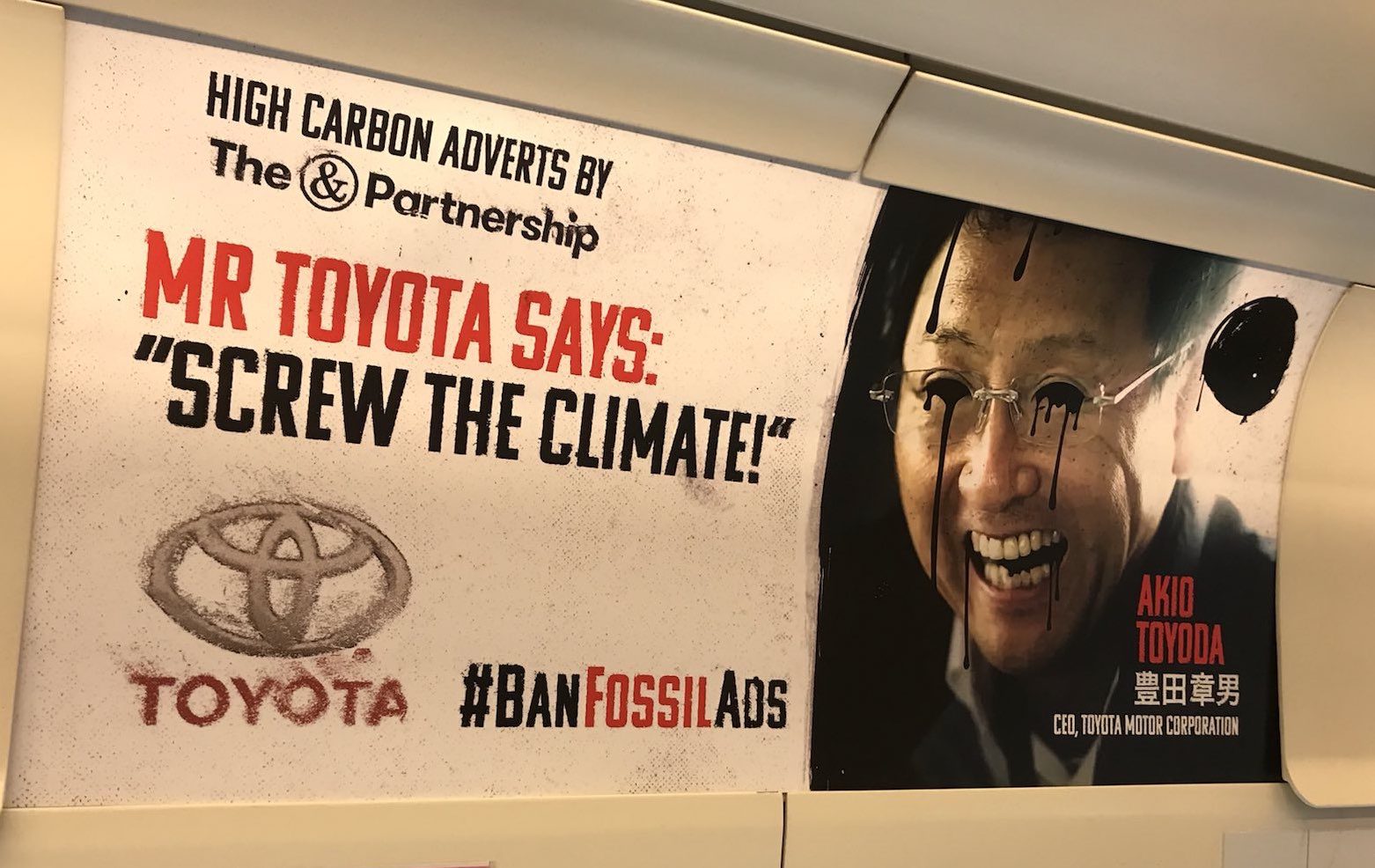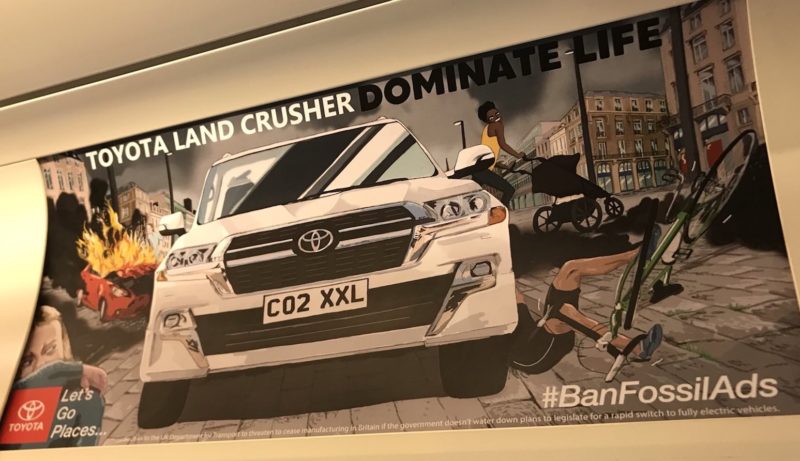Car giant Toyota could face fines of up to $50 million after it was referred to the Australian Competition and Consumer Commission (ACCC) for allegedly making misleading claims regarding the environmental performance of its vehicles and its net zero ambitions.
The 25 page complaint was filed by Greenpeace Australia and alleges the car company has been overstating its emissions and clean transport efforts.
“We believe Toyota Motor Corporation’s advertising is misleading Australian consumers by understating its cars’ emissions and overstating its commitment to clean transport,” said Lindsay Soutar, Director of Greenpeace Australia Pacific’s Electrify campaign.
“Toyota Motor Corporation makes claims in its advertising that give the false impression the company is leading the transition to clean cars, but the truth is Toyota is not leading the transition but is acting globally to block the take-up of electric vehicles.” Said Soutar
“All companies have a duty to tell the truth about their products. That standard must apply especially to a company like Toyota, which is Australia’s largest and until now most-trusted car maker.” she said. “There needs to be a level playing field so that consumers can make informed choices about how to use their purchases to protect the environment.”
ACCC to step up crackdown on ‘greenwashing’
The complaint, which was lodged on Friday by the law firm Environmental Defenders Office on behalf of Greenpeace Australia Pacific, was made just a day after the ACCC announced that it was planning a crackdown on corporate greenwashing.
Last week, the ACCC released an analysis it had conducted of 247 businesses showing that over half had promoted concerning claims about environmental credentials such as overstating climate action to developing their own certification schemes.
The ACCC has indicated that in response to the analysis it will now step up its investigations of corporate greenwashing in Australia.
Toyota’s record under scrutiny
Greenwashing is dangerous because it lulls consumers into a false sense of security about the environmental and climate credentials of the products they purchase. This means that greenwashing can significantly mislead and negatively skew the public discourse and hamper efforts to decarbonise the economy and avoid catastrophic climate change.
Greenpeace Australia Pacific’s complaint alleges that Toyota is misleading markets and making claims in its advertising that give the false impression the company is leading the transition to clean cars, when in reality it has been a laggard and is slowing the transition to clean transport.
Greenpeace says:
- Toyota’s net zero plans are potentially misleading and contradict their actions in terms of the production of new cars.
- Toyota is not seeking a rapid transition to eco-friendly cars and has actively lobbied to halt, weaken or delay emissions standards around the world.
- Hybrids, hydrogen, and electric vehicles (EVs) are vastly different in their environmental impact and their consistency with zero emissions.
- The extent to which emissions reductions can be achieved in a petrol vehicle are significantly less than those that can be achieved by switching to hybrids.
- Mirai hydrogen cars are unlikely to be powered by green hydrogen in Australia and therefore cannot be considered “low emission” vehicles.
- Toyota’s vehicles may not meet emission standards in real-world use as opposed to test conditions.
- Hybrids require fuel to power their electric battery.
Toyota’s record of lobbying governments to slow the transition to EVs has been highlighted in a recent submission to the Australian government’s National Electric Vehicle Strategy.
Although appearing to support the introduction of vehicle emission standards (Australia and Russia are the only countries in the OECD that currently don’t have any standards), Toyota’s submission attempts to water down the strength of the standards.
It calls on the government to include loopholes such as “super credits” and “off-cycle credits” that can obscure manufacturers’ true emissions.

Toyota either unwilling or unable to produce electric vehicles
Toyota is the largest car maker in the world and currently produces around 10 million petrol and diesel cars each year. Electric vehicles only make up 0.2% of Toyota’s total production meaning the world’s transition to EVs is a threat to its current business model.
In January activists in Europe ‘hacked’ over 400 Toyota and BMW billboards calling for a complete ban on petrol and diesel car advertising.

The automotive industry spends an astronomical amount of money advertising its highly polluting vehicles. In the US, the ten biggest car companies including Toyota, Volkswagen, General Motors and Ford spent US$12 billion on ads in 2021 alone.
This makes the car industry one of the largest clients for television, radio and newspaper companies, which may be why the mainstream media rarely reports on the terrible health and environmental impacts of petrol and diesel cars.
If the ACCC finds that Toyota has indeed mislead Australians it could ban specific ads as well as issuing fines.
Many groups including Comms Declare are calling on the Australian government to follow countries like France and ban fossil fuel car advertising all together.
Toyota’s actions not just wrecking the climate but public health
The Driven’s take: The allegations of greenwashing against Toyota’s environmental and climate claims come as legacy automotive companies come under even more scrutiny after recent shocking reports showing that the impacts of petrol and diesel exhaust pollution on health are much worse than previously understood.
Two weeks ago a Vehicle Pollution Forum in Melbourne presented new research showing that petrol and diesel car exhaust pollution causes more than 11,000 premature deaths in adults each year in Australia.
In addition to the deaths, the research has also revealed that vehicle emissions in Australia may cause over 12,000 cardiovascular hospitalisations, 66,000 active asthma cases, and almost 7,000 respiratory hospitalisations per year.
Comment has been sought from Toyota.

Daniel Bleakley is a clean technology researcher and advocate with a background in engineering and business. He has a strong interest in electric vehicles, renewable energy, manufacturing and public policy.


